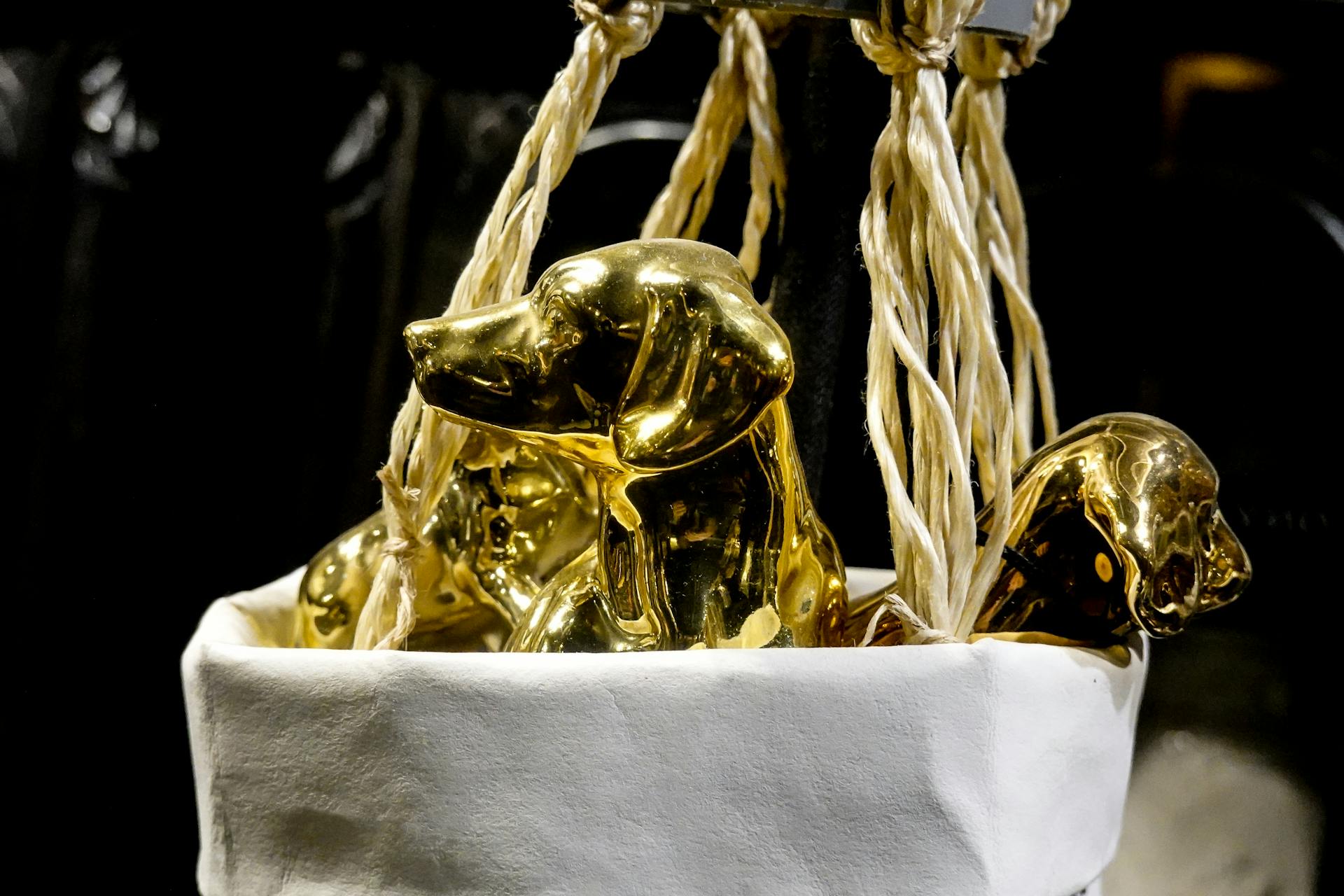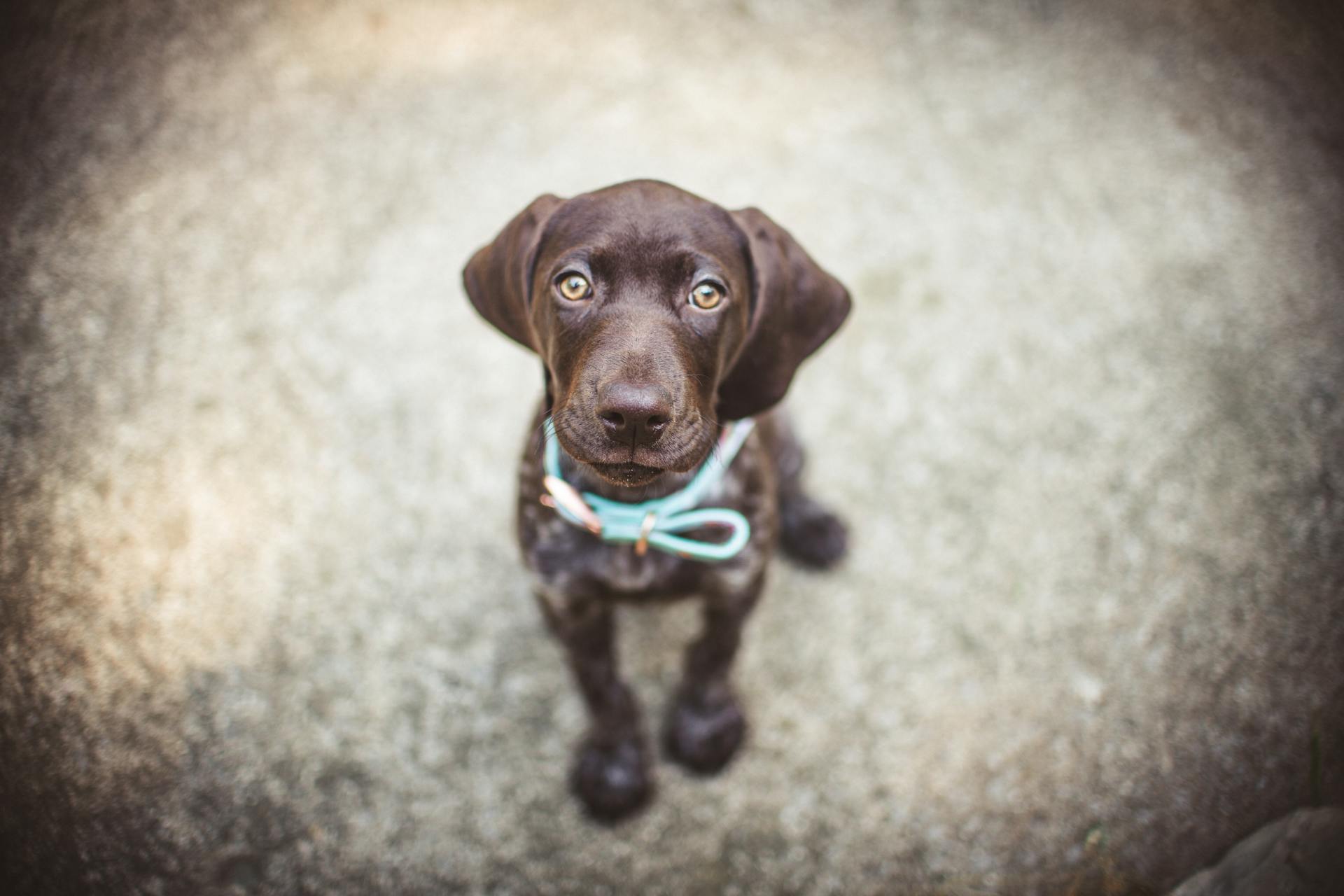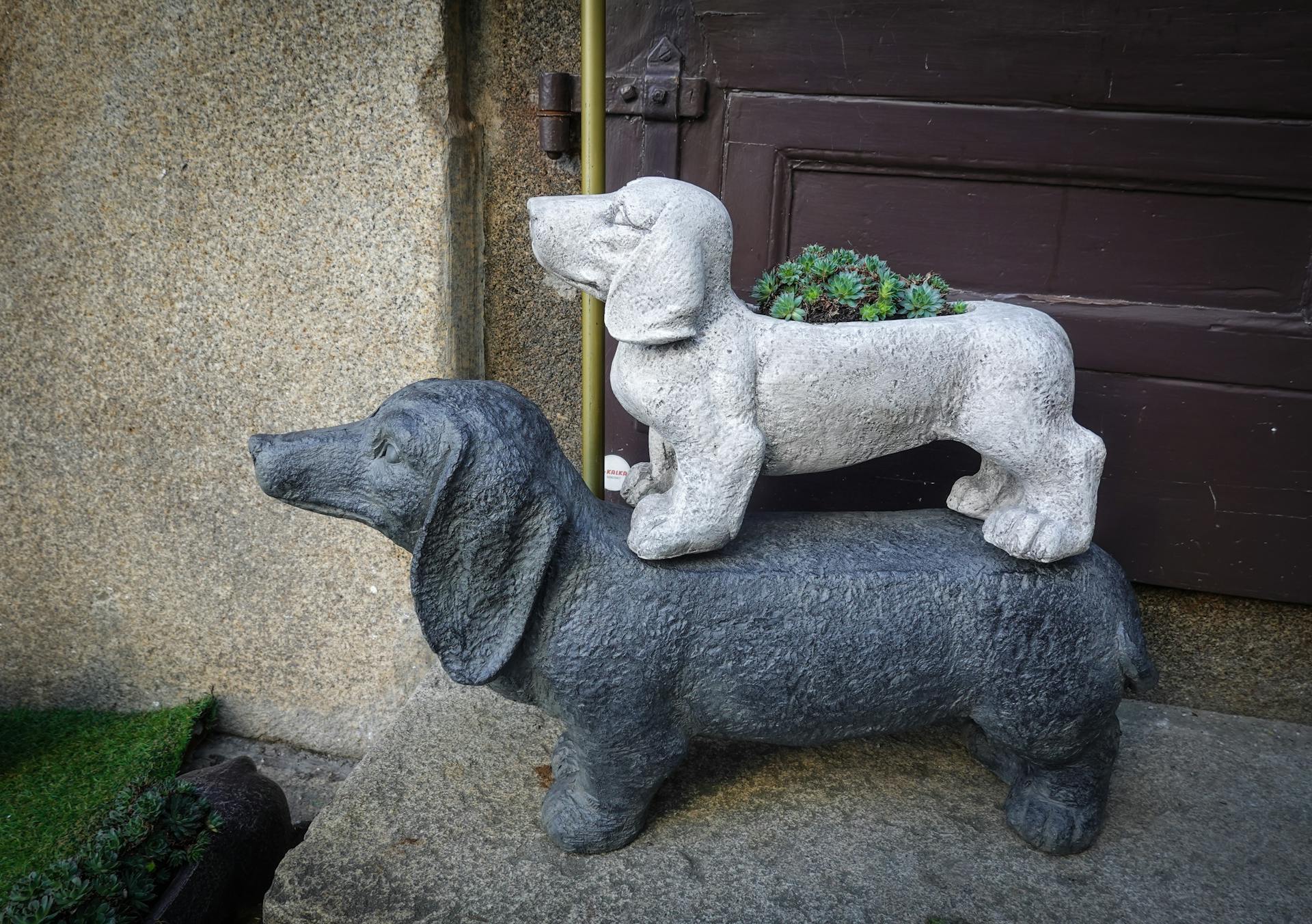
Smooth-haired Dachshunds are often considered a good option for allergy sufferers due to their low-shedding coat. They require regular grooming to prevent matting and tangling.
Their single layer coat sheds very little, making them a more hypoallergenic breed compared to others. This is because they don't release as many dander particles into the air.
One of the reasons why smooth-haired Dachshunds are a good choice for allergy sufferers is that they produce fewer allergens than other breeds. Their coat type is one of the main factors that contribute to this.
Their low-shedding coat also means they require less frequent bathing, which can be beneficial for people with allergies.
Recommended read: Are Dachshunds Good Apartment Dogs
Understanding Dachshunds and Allergies
Dachshunds and allergies can be a tricky combination, but understanding the basics can help you make an informed decision about bringing one home.
Contrary to popular belief, a hypoallergenic dog doesn't mean zero allergies - it just means they're less likely to trigger a reaction.
A hypoallergenic dog sheds less dander, those tiny, often invisible skin flakes that trigger allergies. This can make a big difference, but it's not a guarantee.
Experts agree that every dog, including Dachshunds, produces allergens, but the amount can vary depending on the breed and individual dog.
If you're considering a Dachshund but have allergies, a little chat with your friendly neighborhood vet might be in order. They can provide insights tailored to your specific situation.
There are many myths about dog allergies, but here are a few debunked:
- Hypoallergenic means allergy-proof.
- Certain breeds are 100% allergy-friendly.
- Allergies are only triggered by fur.
- Regular grooming eliminates all allergens.
- If you have allergies, you can't have a dog.
In reality, no dog is entirely hypoallergenic, and every dog has the potential to trigger allergies. It's about finding a balance and taking steps to manage symptoms.
So, what are the main sources of allergens in dogs? Dog dander, saliva, and urine are the top culprits.
Here are some tips to help allergy sufferers live with their furry friends, including Dachshunds:
- Bathe and brush them frequently to reduce dander.
- Vacuum often to remove allergens from your environment.
- Consider immunotherapy or other medical treatment to help manage symptoms.
- Buy an air purifier to eliminate airborne allergens.
- Wash your clothes and bedding regularly to reduce allergen exposure.
- Keep your dog off carpet and couches to reduce allergen accumulation.
It's also essential to know your enemy - get an allergy test to understand the severity of your reaction and tailor a plan to manage symptoms.
By understanding the dynamics of Dachshunds and allergies, you can make an informed decision about bringing one home and find ways to manage symptoms and enjoy your furry friend.
Hypoallergenic Breeds and Dachshunds
The myth of hypoallergenic breeds is just that – a myth. No dog breed is entirely hypoallergenic, and Dachshunds are no exception. They all have the potential to stir up allergies to varying degrees.
Some breeds, like Dachshunds, might cause fewer allergy-related issues, but it's not about eradicating allergens, it's about minimizing them. The experts agree that Dachshunds, like all dogs, do produce allergens, but the amount can vary.
If you're considering a Dachshund but have allergies, it's essential to consult with your vet to get insights tailored to your specific situation. They can help you make an informed decision about whether a Dachshund is right for you.
Broaden your view: Hypoallergenic Dog Breed Mixes
Why Dachshunds Aren't Hypoallergenic
Dachshunds have three coat types: smooth, long-haired, and wire-haired, but none of them are low-shedding.
The smooth-coated Dachshund sheds moderately year-round, which is not ideal for people with allergies.
Long-coated Dachshunds shed moderately all year as well, with their sleek and sometimes wavy hair releasing more hair than you'd expect.
Readers also liked: Collie Smooth Collie
Wire-haired Dachshunds are the heaviest shedders of the three, releasing a lot of hair during the spring and fall seasons.
Moderate shedding is not what you want if you're looking for a hypoallergenic breed, unfortunately.
As a dog owner, I can attest that Dachshunds require regular grooming to manage their shedding, which can be a challenge for some owners.
Their undercoat is particularly prone to shedding, especially during seasonal changes.
Alternative Breeds
If managing allergies with a Dachshund is tough, you might want to consider other breeds that are more hypoallergenic.
If you're looking for a breed that's similar to the Dachshund, but with a lower allergen count, you might want to consider the Portuguese Water Dog. This breed is a great option for those who love the Dachshund's energetic and playful personality, but need a breed that produces fewer allergens.
The Bichon Frise is another breed that's known for being low-shedding and hypoallergenic. They require regular grooming to prevent matting, but they're a great option for those who want a small, playful companion.
Curious to learn more? Check out: Are Great Danes Hypoallergenic Dogs
The Maltese is a small, white dog that's known for its silky coat and gentle nature. They're a great option for those who want a low-maintenance breed that's easy to care for.
The Poodle is a popular breed that's known for being highly intelligent and easy to train. They come in a variety of sizes, from Toy to Standard, and are a great option for those who want a breed that's both hypoallergenic and highly trainable.
Consider reading: Are Dachshunds Easy to Train
Dachshund Grooming and Allergies
Smooth-haired Dachshunds are not entirely hypoallergenic, as they still produce allergens. Regular grooming can help minimize allergens, but it's not a magic solution.
Brushing your Dachshund frequently can remove loose fur and dander, reducing the amount that spreads throughout your home. Brushing outdoors is ideal, as it keeps the allergens outside.
A simple step to understanding your allergies is to get an allergy test. This will reveal the severity of your reaction, helping you tailor a plan to manage symptoms.
Dander is a major allergen, and Dachshunds, like all dogs, produce it. Regular grooming and bathing can reduce the amount of dander on your dog's skin and coat, potentially reducing the severity of allergic reactions.
Here are some practical tips to help manage allergic reactions to Dachshunds:
- Bathe and brush your Dachshund frequently to reduce allergens.
- Vacuum often, especially with a high-quality vacuum designed to target pet fur and dander.
- Consider immunotherapy or other medical treatment to help manage symptoms.
- Use a HEPA air purifier to eliminate airborne allergens.
- Wash your clothes and bedding frequently to reduce allergen buildup.
- Keep your dog off carpet and couches, and provide a comfortable bed for them to sleep in.
Dachshund Coat Types
Dachshunds come in three distinct coat styles: smooth, long-haired, and wirehaired. Each coat type has its own unique flair.
Smooth-coated Dachshunds might shed less visibly, but they're not completely allergen-free. Long-haired Dachshunds bring an extra layer of fluffiness, while wirehaired ones add a bit of texture to the mix.
It's not a hard and fast rule that longer hair means more allergens. Dachshund coat types might not be as straightforward as they seem when it comes to allergens.
Low-shedding breeds, like some Dachshund coat types, are often recommended for people with pet allergies. However, it's essential to remember that low-shedding breeds will still shed skin cells and saliva into the environment.
Dachshund coat types don't necessarily determine their allergenicity. It's more about how much they shed and how well you maintain your home.
If this caught your attention, see: Wirehaired Terrier Hypoallergenic
Dachshund Grooming Practices
Dachshund grooming practices are essential for reducing allergens and keeping your furry friend clean. Regular grooming can make a big difference in minimizing allergens in your home.
Brushing your Dachshund outdoors is key to keeping loose fur and dander at bay. Research shows that this practice really does make a difference in reducing allergens in pet owners' homes.
A good brushing session can help reduce dander, which is a major allergen for many. Dachshunds, like all dogs, produce dander, and regular grooming can help minimize its impact.
Here are some tips for grooming your Dachshund:
- Bathe your dog once a week using dog shampoo to wash out allergens.
- Brush your Dachshund's coat regularly to remove loose fur and dander.
- Get someone else in the household to do this job, or have a regular appointment with a groomer to limit your exposure.
By following these tips, you can help reduce the amount of dander on your Dachshund's skin and coat, and potentially reduce the severity of allergic reactions.
Dog Allergens and Symptoms
Dog allergens aren't just about fur; proteins in a dog's skin cells, urine, and saliva can also trigger allergies. These proteins can be present in Dachshunds, including smooth-haired ones.
Symptoms of dog allergies include itchy eyes, runny nose, sneezing, coughing, red and watery eyes, wheezing, skin rash, hives, and swelling. It can even lead to difficulty breathing, itchy ears, itchy throat, sinus congestion, shortness of breath, and asthma flare-ups.
Low-shedding breeds like Dachshunds may still shed skin cells and saliva into the environment, exposing you to allergens. However, they may not trigger a reaction as easily as high-shedding breeds.
Dander attaches itself to a dog's fur and is released when they shed, spreading allergens around the house. Keeping your bedroom dog-free can help eliminate allergens you breathe in while sleeping.
It's essential to understand your individual allergies and how they react to Dachshunds. Some people may experience severe reactions, while others may be more tolerant.
Discover more: Skin Disorders Dachshunds
Living with Dachshunds and Allergies
If you're considering adopting a Dachshund but have allergies, it's essential to understand the dynamics at play. No dog is entirely hypoallergenic, but some breeds, like the Dachshund, may be more allergy-friendly than others.
The amount of allergens produced by a Dachshund can vary, and it's not just about the type of coat. Smooth, long-haired, or wirehaired Dachshunds all produce allergens, but the amount can differ. It's like choosing between carpets - a well-maintained carpet can be a good option, but it's not a hard and fast rule.
Regular grooming can help minimize allergens, but it's not a magic spell. Brushing your Dachshund frequently, ideally outdoors, can help keep loose fur and dander at bay. Bathing your dog once a week and washing your hands after touching your pet can also reduce exposure to allergens.
If you decide to adopt a Dachshund, consider the severity of your allergy and take steps to manage it. You can bathe and brush your dog frequently, vacuum often, and use an air purifier to reduce allergens in your home. Washing your clothes and bedding regularly can also help minimize exposure.
Here are some tips to help you live with a Dachshund if you have allergies:
- Bathe and brush your Dachshund frequently
- Vacuum often with a high-quality vacuum designed to target pet fur and dander
- Use an air purifier, especially in your bedroom
- Wash your clothes and bedding regularly
- Keep your Dachshund off carpet and couches
- Consider immunotherapy or other medical treatment to help manage your allergies
Remember, it's not about finding a mythical hypoallergenic dog; it's about understanding the dynamics and finding a furry companion whose allergen levels align with your comfort.
Featured Images: pexels.com


